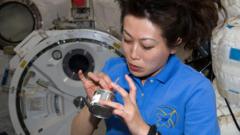A groundbreaking effort led by the European Space Agency (ESA) has set the stage for cultivating food in the vastness of space, as an ambitious experiment launched today seeks to grow lab-grown dinner items like steak, mashed potatoes, and desserts. This initiative aims to evaluate the potential of producing nourishment in the low gravity and heightened radiation conditions of space, a critical component for future multi-planetary living.
As part of the ESA project, researchers are investigating the viability of producing food with a significantly reduced cost, currently estimated at a staggering £20,000 per astronaut per day. The dream of developing a compact food production facility on the International Space Station (ISS) could soon transition from concept to reality, with plans to establish such a plant within the next two years.
Dr. Aqeel Shamsul, CEO and founder of Frontier Space, led the initiative in collaboration with Imperial College London researchers. He emphasized the pressing need to develop off-world manufacturing facilities for sustained human presence in space. “Our aspiration is to one day operate factories in orbit and on the Moon,” he stated.
The production of lab-grown food involves cultivating ingredients, including proteins, fats, and carbohydrates, in bioreactors, simulating traditional food production but without reliance on Earth’s agricultural systems. Although lab-grown meats are available in certain markets on Earth, the hurdles posed by launch expenses highlight the urgency to establish local production capabilities in space.
“If we can start by enhancing basic items like mashed potatoes, we could eventually use 3D printing to create complex dishes like steak directly on the ISS,” Dr. Shamsul suggested, hinting at a future where gourmet space dining could thrive.
The ESA mission successfully sent a simplified bioreactor into orbit onboard a SpaceX Falcon 9 rocket. Researchers aim to determine whether the same food production processes that work on Earth can adapt to the challenges of space. The experiment, which will orbit the Earth for roughly three hours, will collect data crucial for designing an upgraded bioreactor for future missions.
However, lab-grown food production comes with its own set of challenges, including the unappealing appearance of the developed “food” – a gooey substance currently considered less inviting than traditional astronaut food. Chef Jakub Radzikowski from Imperial College is developing recipes using natural starches and proteins, preparing to replicate global cuisines for future astronauts once regulations allow lab-grown ingredients.
As they sampled new culinary creations, such as spicy dumplings, UK astronaut pioneer Helen Sharman praised the initiative for its potential to enhance the dietary experience of astronauts. “This could positively impact both their health and morale,” she remarked, pointing out that ensuring variety in astronaut diets could help combat weight loss and nutritional deficiencies experienced on long missions.
The results from today’s mission promise to guide future endeavors in space-based food production, potentially revolutionizing how astronauts eat and live during extended stints away from Earth.

















